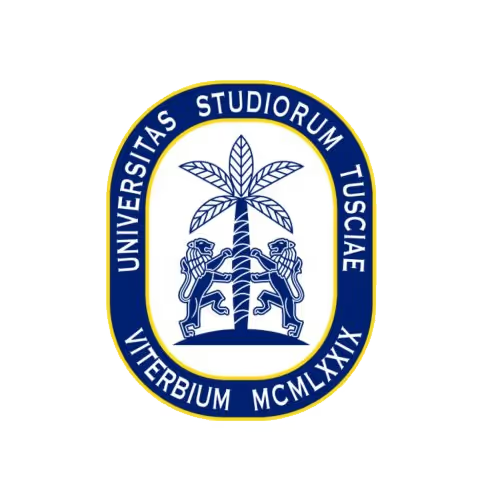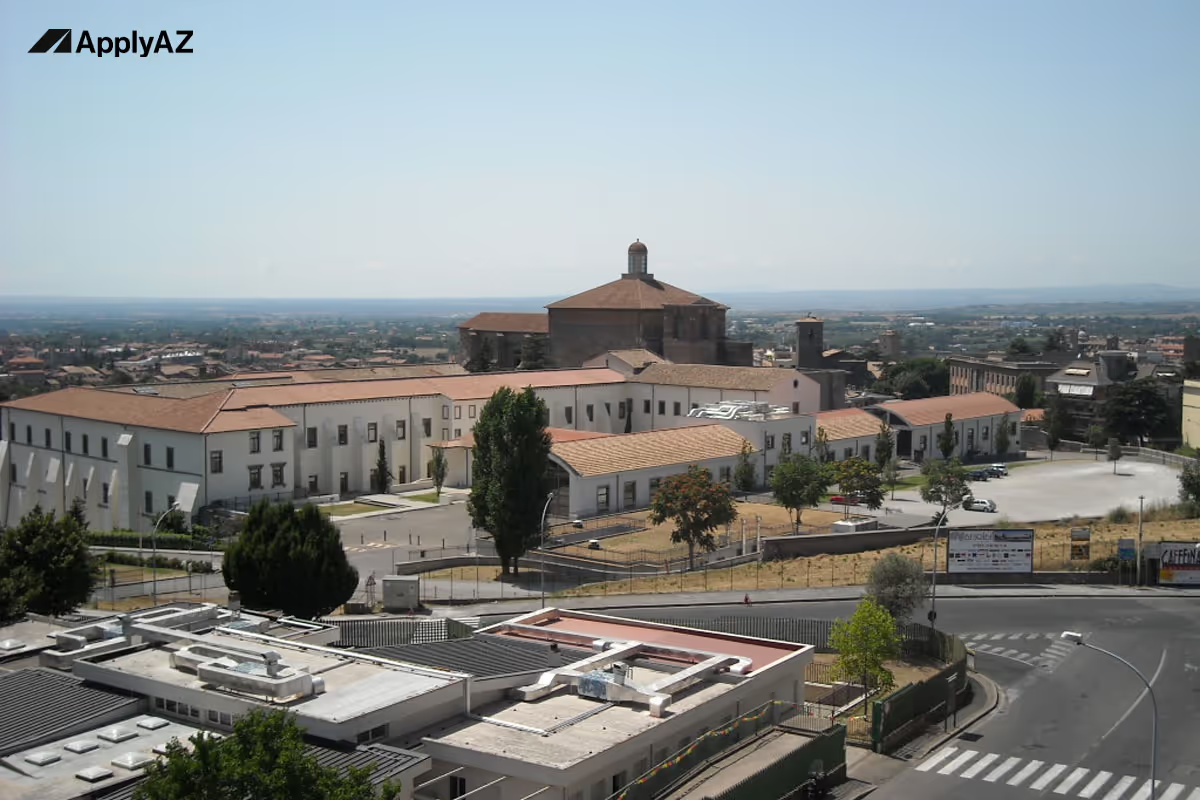Heading
Heading








University of Tuscia (Università degli Studi della Tuscia)
English-taught programs in Italy are booming, and the University of Tuscia (Università degli Studi della Tuscia) is part of that growth. Here you study in Italy in English, pay the low fees typical of tuition-free universities Italy, and enjoy the academic standards found across public Italian universities. Founded in 1979, Tuscia focuses on agri-food science, forestry, circular economy, and cultural heritage—fields that match the volcanic landscapes, Etruscan ruins, and bio-economy clusters of its home city, Viterbo.
A young public Italian university with deep local roots
Tuscia began as a network of small faculties housed in Renaissance cloisters. It now hosts six departments:
- Agriculture and Forestry Sciences
- Ecological and Biological Sciences
- Economics, Engineering, Society and Business
- Linguistics, Literature, History, Philosophy and Heritage
- Innovation in Biological, Agro-food and Forestry Systems
- Law and Social Sciences
The university ranks in the global top 400 for Agriculture and Forestry (QS 2025) and appears in the Times Higher Education Impact Rankings for Climate Action. Researchers advise FAO and UNESCO on food security and heritage conservation. With seminar groups rarely larger than 30 students, you work directly with professors on lab projects, field surveys, and peer-reviewed papers.
What you can study in Italy in English
Current English-taught degrees include:
- Circular Economy and Sustainable Tourism
- Forestry and Environmental Sciences
- Food Science and Technology
- Cultural Heritage – From Field to Digital
All follow the Bologna Process, so you can transfer credits or progress easily to European master’s programmes.
Viterbo: a medieval city that doubles as a living lab
Everyday life and affordability
Viterbo is a walled city of 65 000 residents, one hour north of Rome by train. Cobblestone lanes, natural hot-spring baths, and student cafés keep life relaxed and affordable.
- Housing: €260–350 per month for a single room in a shared flat.
- Meals: Mensa lunch costs €4.50 for pasta, salad, and fruit.
- Transport: A €20 monthly bus pass covers the city and nearby lakes.
- Climate: Winters hover around 6 °C; summers reach 30 °C but cool at night—perfect for outdoor study sessions.
Culture and leisure
- UNESCO-listed Macchina di Santa Rosa festival each September.
- Weekly farmers’ markets selling local hazelnuts and volcanic-soil vegetables.
- Romanesque churches, Etruscan tombs, and free museum nights.
Free Italian courses and tandem-language cafés help you integrate while keeping English as your study medium.
How the DSU grant helps
- Full fee waiver
- Free housing or rent allowance
- Two daily meals in canteens
- €1 700 yearly stipend for books and local travel
About 70 % of eligible applicants receive funding. ApplyAZ advisers guide you through translations, legalisations, and online forms.
Other options:
- Tuscia Merit Scholarship (€5 000) for top entrance-test scores
- Erasmus+ mobility grant (€400–500 per month)
- Ministry of Foreign Affairs scholarships for selected countries
Learning model: fieldwork, labs, and industry briefs
Hands-on classes
- Soil microbiology: collect samples in chestnut groves, analyse DNA in campus labs.
- Digital archaeology: 3-D scan Etruscan sites and build virtual tours.
- Circular-economy design: prototype bioplastic products in the FabLab.
Real-world projects
Professors embed consultancy tasks from local partners:
- Map drought risks for Acea (regional utility).
- Optimise hazelnut supply chains for Ferrero.
- Design visitor-flow dashboards for Lazio tourism board.
These projects add measurable impact to your CV.
Job and internship landscape
Key industries around Viterbo
- Agri-food and horticulture (hazelnuts, wine, olive oil)
- Forest management and biomass
- Cultural-heritage tourism and restoration
- Renewable energy (geothermal, solar)
Major employers
- ENEA Casaccia Research Centre (energy transition)
- Lazio Innova hub (agritech start-ups)
- Fiera di Roma (trade-fair organiser needing event analysts)
Non-EU students can work 20 hours weekly during term, full-time in breaks, easing living costs and building networks.
Graduate pathways
Tuscia alumni move on to:
- MSc in Plant Biotechnology at Wageningen University
- Erasmus Mundus master in Forestry Science (SUFONAMA)
- PhD in Cultural Heritage at the European University Institute
- Analyst roles at FAO headquarters in Rome
Employability stands at 88 % within one year (AlmaLaurea 2024), thanks to skills in field data, sustainability reporting, and digital heritage.
Why choose the University of Tuscia and Viterbo
- Quality teaching focused on green and heritage sectors.
- Affordable living in a historic yet student-friendly city.
- English-taught flexibility with free Italian support.
- Hands-on research that tackles climate, food security, and culture.
- Easy train link to Rome for internships and flights home.
Together they offer a balanced, inspiring, and budget-friendly route to a European degree.
In two minutes we’ll confirm whether you meet the basic entry rules for tuition-free, English-taught degrees in Italy. We’ll then quickly see if we still have space for you this month. If so, you’ll get a personalised offer. Accept it, and our experts hand-craft a shortlist of majors that fit your grades, goals, and career plans. Upload your documents once; we submit every university and scholarship application, line up multiple admission letters, and guide you through the visa process—backed by our admission-and-scholarship guarantee.
Agricultural and Environmental Sciences at University of Tuscia
Choosing where to build a green career is not easy. The Agricultural and Environmental Sciences bachelor at the University of Tuscia (Università degli Studi della Tuscia) offers a clear path. You will join one of the fastest-growing English-taught programs in Italy, live in medieval Viterbo, and pay the modest fees common at tuition-free universities Italy. As part of the national system of public Italian universities, Tuscia delivers research-led teaching, small classes, and direct links to Europe’s agri-food and climate-innovation sectors—all in English.
1 | Why an English-taught agriculture degree in Viterbo?
The university opened in 1979 to serve the fertile Lazio countryside. Today it ranks in the QS global top 400 for Agriculture and Forestry and features in the Times Higher Education Impact tables for Climate Action. Class sizes rarely exceed 30 students, so you discuss soil genomics, remote-sensing data, and circular-economy business plans with professors who advise FAO, ESA, and UNESCO.
Tuscia’s campus spreads across restored cloisters and modern greenhouses. Raspberry-pi weather stations, drone platforms, and fermentation bioreactors turn theory into immediate practice. You will sample volcanic soils, test water from thermal springs, and identify insect pests in olive groves still farmed as they were two thousand years ago. Few English-taught programs in Italy can offer such a living lab.
2 | Course structure: study in Italy in English and master climate-smart farming
The degree awards 180 ECTS over six semesters. All required modules are taught in English; free Italian classes fit your schedule if you want deeper integration or part-time work.
Year 1 – Scientific foundations
- General chemistry for life sciences
- Botany and plant physiology
- Principles of economics (farm budgeting)
- Statistics with R for biologists
- Soil science lab—texture, pH, and organic-carbon tests
Field trip: map soil variability across a hazelnut orchard supplying Ferrero.
Year 2 – Integrated systems
- Zoology and integrated pest management
- Microbiology of compost and biogas
- Hydrology and irrigation engineering
- Geographic Information Systems (GIS) for land-use planning
- Renewable-energy options for farms
Industry project: design a drip-irrigation schedule that saves 30 % water in a tomato greenhouse.
Year 3 – Sustainability and innovation
- Agro-ecology and biodiversity indicators
- Climate-change adaptation in Mediterranean crops
- Circular economy in agri-food chains
- Electives: precision beekeeping, forest-fire modelling, sustainable aquaculture
- Six-month internship and thesis linked to a research group or company
Past theses analysed drone imagery to predict grape ripeness and built carbon budgets for chestnut forests.
Continuous assessment—lab reports, oral exams, and team presentations—replaces most high-pressure finals, keeping stress low and feedback quick.
3 | Campus life and culture: what to expect in Viterbo
- Affordability – Shared flats cost €260–350 per month; university dorms charge similar and include utilities.
- Transport – A €20 student bus pass covers the city plus Lake Bolsena. Rome is 80 minutes by train for €7.
- Meals – Mensa lunches (€4.50) feature local olive oil, seasonal vegetables, and vegetarian options.
- Climate – Mild winters (6 °C) and warm summers (30 °C with cool nights).
- Leisure – Hot-spring pools, medieval street festivals, and free museum nights.
The medieval walls hold cosy cafés where an espresso costs €1.30. Language tandems pair you with Italian peers who need English for Erasmus. Evening hikes in the Cimini Mountains provide study breaks with panoramic views.
DSU grant highlights
- Full fee waiver
- Free housing or rent allowance
- Two canteen meals per day
- €1 700 yearly stipend for books and local travel
Roughly 70 % of eligible students win DSU support. Extra options include the Tuscia Merit Scholarship (€5 000), Erasmus+ mobility grants, and national scholarships for international students in Italy.
5 | Labs, field stations, and research centres
- NOVA Greenhouse Complex – Controlled-environment farming for lettuce and medicinal plants.
- Forest Remote-Sensing Hub – Drones with multispectral cameras track wildfire risk.
- Bio-economy Incubator – Start-ups turn food waste into bioplastics and natural dyes.
- Soil-Microbiome Sequencing Core – Next-generation sequencers for carbon-sequestration studies.
Undergraduate interns gain access after safety training. Publishing a co-authored paper as a bachelor student is common—a major plus when applying for master’s scholarships.
6 | Industry network and internships
Local strengths
- Hazelnut and olive value chains—quality control labs feed Ferrero and premium oil brands.
- Niche wine estates—interns monitor phenolics and water stress for DOC and IGP labels.
- Forestry biomass—companies convert pruned branches into pellets.
- Eco-tourism—agrirural lodges need sustainability auditors.
Wider connections
Fast trains reach Rome’s UN FAO headquarters, ENEA energy labs, and biotech firms. Past students interned at the European Space Agency (climate-data unit) and Barilla’s sustainable-grain programme in Parma.
Job outcomes
AlmaLaurea 2024 data show 90 % employment within twelve months. Graduates work as:
- Farm-innovation consultants
- GIS analysts for watershed agencies
- Sustainable-supply-chain coordinators
- Research assistants in EU Horizon projects
Starting salaries average €30 000 in Italy and €38 000 elsewhere in Europe.
7 | Soft skills and student activities
- Model UN Climate Track – Debate soil-carbon markets.
- Beekeeping club – Manage hives on campus rooftops.
- Data-thon – Crunch Copernicus satellite data to map drought risk.
- Green-entrepreneurship lab – Pitch start-ups to Lazio Innova investors.
These activities build communication, coding, and leadership—traits valued by employers.
Ready for this programme?
If you qualify and we still have a spot this month, we’ll reserve your place with ApplyAZ. Our team will tailor a set of best-fit majors—including this course—and handle every form and deadline for you. One upload, many applications, guaranteed offers, DSU grant support, and visa coaching: that’s the ApplyAZ promise. Start now and secure your spot before this month’s intake fills up.

They Began right where you are










